S.R. Piccoli's Blog, page 2
April 4, 2025
Twenty Years Ago
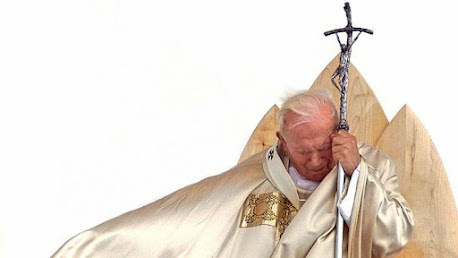
Twenty years ago, Saint John Paul II the Great left this world. What he was for humanity and in the eyes of history is well known to all, and it is hardly debatable that he was a giant—one of those men who leave an indelible mark.
What he was for me, however, is almost impossible to put into words. He was—and still is—an emotional tsunami, capable of transforming words, gestures, facial expressions, and the tone of his voice into a living miracle of faith, greatness, beauty, and spiritual strength.
His memory is one of the very few things that can still bring a lump to my throat and tears to my eyes. For years, even from afar, I witnessed the pages of history he wrote with his own hands. I had this incomparable privilege, and I remain deeply grateful to the Lord for it.
The least I can do is try not to be entirely unworthy, in hindsight, of the gift I was given. An impossible task, I know—but I'm doing my best...

COPYRIGHT NOTICE:All original content of this blog [Wind Rose Hotel] is subject to Creative Commons license (by-nc-sa)
March 24, 2025
If I Ever Found Myself Sinking into Depression
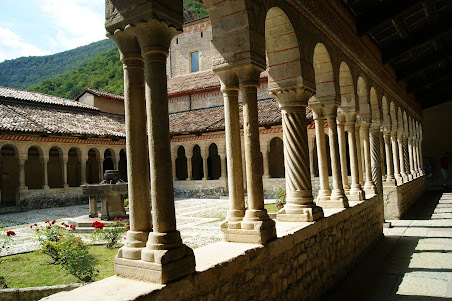 Cistercian Abbey of Follina (Tv, Italy)
Cistercian Abbey of Follina (Tv, Italy)My take on Marcello Veneziani's heartfelt oration in defense of Vittorio Sgarbi—now ravaged by depression—in the hope that he may rediscover his will to live and passion for all that made him famous. Click here for an Italian version of this post.

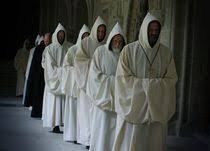 Cistercian monksMarcello Veneziani has gifted us with a heartfelt orationin defense of Vittorio Sgarbi—a moving and intelligent tribute to the great artcritic, now ravaged by depression—in the hope that he may rediscover his willto live and passion for all that made him famous. An exhortation that willlikely linger in the minds of Marcello’s readers, as well as Sgarbi’s admirers,tailored so precisely to its subject that it holds no universal value. BecauseSgarbi is truly one of a kind—an Oscar Wilde-like figure, a Po Valley DorianGray, both carnal and spiritual, a hedonist yet open to the sacred all at once.
Cistercian monksMarcello Veneziani has gifted us with a heartfelt orationin defense of Vittorio Sgarbi—a moving and intelligent tribute to the great artcritic, now ravaged by depression—in the hope that he may rediscover his willto live and passion for all that made him famous. An exhortation that willlikely linger in the minds of Marcello’s readers, as well as Sgarbi’s admirers,tailored so precisely to its subject that it holds no universal value. BecauseSgarbi is truly one of a kind—an Oscar Wilde-like figure, a Po Valley DorianGray, both carnal and spiritual, a hedonist yet open to the sacred all at once.Yet beyond the merits of Veneziani’s article and thetruths so vividly evoked, I found myself reflecting—in a way that mirrors myown inner world. In short, I wondered what I would need to hear from a friend,ideally one as inspired as Veneziani, if it were me falling into depression.After all, I’m around the same age, with my own share of aches and pains. Bythe grace of God, though, I’m not depressed.
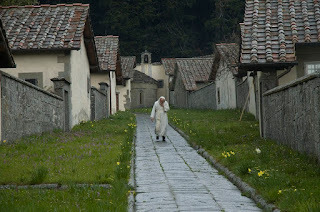 Hermitage of Camaldoli (Ar, Italy)
Hermitage of Camaldoli (Ar, Italy)Well, the answer comes to me easily: I’d want to hear aheartfelt plea for silence. The silence I’ve known and revered since myyouth—ever since I was fortunate enough to cross the threshold of aBenedictine, Cistercian, or Trappist monastery, or a Camaldolese hermitage, andsavor their stillness, broken only by Gregorian chant and the measured,monotonous footsteps of monks pacing the cloisters. And those scents, those stones,those Romanesque columns, the well at the center, the chime of a bell callingthe faithful to the Liturgy of the Hours before dawn or at twilight.
I’ve toldmyself a thousand times that, by some miracle, there’s a silent monasterywithin me, enclosed within the walls of my body and soul. And inside it,there’s profound peace—even if only for a moment, before being overtaken by aloud, overwhelming wave of reality. But only temporarily, because sooner orlater, that inner hermitage inevitably resurfaces and restores the silence. Andin that absence of noise, somehow, everything around me regains meaning,becoming something worth caring about again. A Camaldolese monk once gave me adefinition of that mystery: a silence inhabited by God.
Yes, I believe that if I were to plunge into depression,the only exhortation with any real chance of reaching me would be an invitationto let myself be enveloped by a silence inhabited by God.

COPYRIGHT NOTICE:All original content of this blog [Wind Rose Hotel] is subject to Creative Commons license (by-nc-sa)
March 12, 2025
A Friend for Trump in Italy
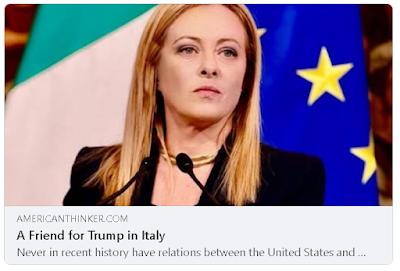
Between the Two Sides of the Atlantic... searching for the West. Why we must hope that the efforts of the Italian Prime Minister are crowned with success. My latest on American Thinker, in which I explain to American readers how Europe views the latest developments in Trump's peace initiative—including the spat with Zelenskyy in the Oval Office—and the role Giorgia Meloni could play in restoring unity within the West.

Never in recent history have relations between the United States and Europe been as tense as in this period — that is, since the Trump administration began taking its first steps and revealing its foreign policy orientation. Over the last few days, the situation has worsened further, or more accurately, it has reached a boiling point, due to the approach — deemed too aggressive by the Europeans — taken by President Trump to the Russo-Ukrainian war and especially to Volodymyr Zelensky. The final straw was the tense public confrontation with President Trump and Vice President Vance in the Oval Office. It was the most heated public exchange of words between world leaders in the Oval Office in memory. The meeting, as we all know, ended with Trump reportedly abruptly instructing his aides to ask Zelensky to leave the White House.
The event, shocking in and of itself — though essentially due to Zelensky’s presumptuous behavior — also sent shockwaves through Europe, where political leaders immediately rallied to Ukraine’s side, forgetting that it is only thanks to Donald if, after three years of war and slaughter, peace is finally being discussed. “There’s an aggressor, which is Russia, and a people attacked, which is Ukraine. We must thank all those who helped and respect those who have been fighting since the beginning,” French president Emmanuel Macron told reporters, after reportedly talking to Zelensky. Germany’s likely next chancellor, Friedrich Merz, reaffirmed his country’s stance, declaring, “We must never confuse aggressor and victim in this terrible war.” He also accused Trump of “deliberately escalating” tensions with Zelensky. U.K. prime minister Keir Starmer said: “Three years on from Russia’s brutal invasion of Ukraine, we are at a turning point. Today I will reaffirm my unwavering support for Ukraine and double down on my commitment to provide capacity, training and aid to Ukraine, putting it in the strongest possible position.”
The leaders of Spain, Poland, and the Netherlands were among those who posted social media messages backing Ukraine. There were also supportive messages from political leaders in Austria, Belgium, Croatia, Denmark, Estonia, Finland, Ireland, Latvia, Lithuania, Luxembourg, Moldova, Romania, Sweden, and Slovenia. European Union chiefs António Costa and Ursula von der Leyen assured Zelensky in a joint statement that he was “never alone.” “We will continue working with you for a just and lasting peace,” they said.
Hungarian prime minister Viktor Orbán was the only one who didn’t join the chorus of support for Zelensky. “Strong men make peace, weak men make war,” he said. “Today President Donald Trump stood bravely for peace,” he continued, “even if it was difficult for many to digest. Thank you, Mr. President!”
What about Italy? Where does Europe’s second-largest manufacturing country and one of the E.U.’s founding members stand? Italy’s prime minister, Giorgia Meloni, merely expressed “sympathy” for Zelensky, carefully avoiding distancing herself from Trump. “She cannot — and doesn’t want — to turn her back on Ukraine because she has gone too far in supporting Kyiv and Zelensky. On the other side, she doesn’t want to give any hint of criticism of Trump, who has attacked Zelensky,” Stefano Stefanini, Italy’s former ambassador to NATO, told the Financial Times.
“She is hedging — she hasn’t decided which way to go,” said Beniamino Irdi, an Atlantic Council senior fellow and former Italian government security policy adviser. “She still thinks that the special relationship she has built with Trump and Musk may be of more value than her relationship with European allies.”
However, on Tuesday, Meloni rejected a plan by France and the United Kingdom to support Ukraine’s war against Russia by sending Italian soldiers. “Italy has expressed doubts regarding the proposal of France and the UK on sending European troops,” she told Italian TV channel Rai1. “I think it is very difficult to implement, I am not sure about its effectiveness, that’s why we announced that we will not send Italian soldiers to Ukraine,” she added. Moreover, speaking on Sunday at Downing Street, she stressed the need of unity between the two sides of the Atlantic:
The only thing that we really cannot afford is a peace that does not remain, and this cannot be afforded. Ukraine cannot afford it, Europe cannot afford it, the United States cannot afford it. For God’s sake, everything can explode. It’s not good news. So everything I can do to keep the West united and to strengthen it, I will do.
Meloni also proposed hosting a summit between European leaders and the U.S., to build bridges after the relationship between the longtime allies strained over the war in Ukraine.
On the day Donald Trump suspended military aid to Ukraine, Giorgia Meloni’s attempt to remain equidistant between Trump and the European Union was put to the test during a special summit that saw all 27 countries agree to Ursula von der Leyen’s “Rearm Europe” plan, but which also highlighted a serious divide over the approach to take. The final text — signed by 26 and hailed as a watershed moment — speaks about “peace through strength,” military assistance and security guarantees for Kyiv, all of which the Hungarian prime minister has strongly opposed. Orbán, who prior to the summit had signaled his intention to veto the E.U. statement, argued that it ran contrary to U.S. president Donald Trump’s deal-making initiative, to which he has firmly aligned himself. The European Council president, António Costa, who called the meeting, said, “Hungary has a different strategic approach on Ukraine, but that means Hungary is isolated among the 27. ... We respect Hungary’s position, but it’s one out of 27. And 26 are more than one.”
As for the rearmament plan, Meloni’s stance is a “yes” but with reservations that could be refined at the formal European Council on March 20–21. “That’s where the decisions are made,” Meloni reminded everyone. There is time to fine-tune the points important to Rome, she said in a press briefing on Thursday. The first is to “change the name,” shifting the focus from weapons to defense and security. The second is to clearly state in advance that Italy will not use the clause allowing Cohesion Funds to be converted into spending on weapons. “Italy will not deprive itself of these precious resources,” said Meloni, announcing that this will be the “deal” she will propose to Parliament ahead of the next European Council.
Moreover, at a press briefing in Brussels, she suggested that NATO’s Article 5 protection could be extended to cover Ukraine even if it is not a full member-state. This would be better than options such as the deployment of peacekeeping forces to monitor a ceasefire, she explained: “Extending the same coverage that NATO countries have to Ukraine would certainly be much more effective, while being something different from NATO’s membership.”
All in all, despite her best intentions and her ideological stance — along with her strong ties to U.S. Republicans — Meloni has had a tough time mediating between Washington, D.C. and Brussels. Yet no leader of a major European country is better suited for that role than she is. Not for nothing was she the only E.U. head of government invited to Trump’s inauguration in January. Earlier the same month, she visited him at Mar-a-Lago, where Trump defined her as a “fantastic woman” who has “really taken Europe by storm.”
If all mediation attempts fail, then an extremely complicated, if not dramatic, phase will open in the history of relations between the two sides of the Atlantic. For this reason, we must hope that the efforts of the Italian prime minister are crowned with success.

COPYRIGHT NOTICE:All original content of this blog [Wind Rose Hotel] is subject to Creative Commons license (by-nc-sa)
March 5, 2025
The Zelenskyy Case and Us Europeans

Once again, the greatest luck for us Europeans is that America exists. Donald J. Trump and JDVance may not be world champions of good manners, but they make up for it withvision, courage, and determination.
These days, more than ever, Europe—the whole of it,including the United Kingdom—is demonstrating the extent to which manipulationby corporate media that are now largely unreliable has had devastating effectson public opinion. Not only governments and parliaments but also the peopleseem to have become incapable of recognizing the stupidity and inadequacy ofVolodymyr Zelenskyy, as well as his madness and the fact that he has brought usto the brink of a Third World War by pursuing the impossible mission of winningan utterly unequal conflict.
Of course, it was Russia that invaded Ukraine, not the otherway around. Of course, Vladimir Putin’s style of governance is far from what’sdescribed in the best textbooks on liberal democratic theory and practice, butthe same can easily be said of Volodymyr Zelenskyy. Moreover, as anyone whoisn’t entirely a victim of the rampant propaganda in the West can see, theUkrainian leader bears responsibility for countless and ongoing provocations,persecutions, and violence against Russian-speaking minorities within his country’sborders. And then there’s the (for Russia) unacceptable prospect of Ukrainepotentially joining NATO, a possibility strongly supported by Zelenskyy andadvocated by many European countries and NATO itself. And then there’s NATO’s Eastwardexpansion since 1997...
Anyone with normal intelligence and intellectual honesty shouldknow that while Russia has its faults, Ukraine, the European Union, the UnitedKingdom, the Biden administration, and NATO also have theirs. But beyond allthis, one fundamental fact remains: Zelenskyy seems to underestimate thepotential cost of his extremism, encouraged by the aforementioned—a globalconflict. What’s more, he gives the impression that that is exactly what hewants. And the same could be said of some countries in the old continent, withNorthern Europe countries, France, and the United Kingdom leading the way. OnlyItaly and Hungary are exceptions, albeit with different nuances. And not justthe governments and parliaments of these two countries, but also the people.
Italy, from this perspective, is a very particular case:with almost all media aligned with Zelenskyy, the people are largely verydistrustful of the Ukrainian leader and see him as a warmonger, a madman, or atthe very least a narcissist and a puppet serving colossal economic andfinancial interests. These days, it’s true, there are quite a few who did notappreciate the treatment he received from Trump and Vance, not to mention themedia, which is 99 percent aligned with the supposed victim of the two “Americanbullies.” But this doesn’t lead mostpeople to change their overall opinion about the Ukrainian leader.
Yet, what’s absolutely striking is that the rest of Europeis with Zelenskyy—mind you, not just with Ukraine, which is entirelyunderstandable, but precisely with its leader. What to say? For one thing,someone should explain to them that looking at the history, even the recenthistory of Ukraine, it is clear that many Ukrainians hate Russia for flaws andfaults that they themselves are deeply affected by. Why, then, should we everget involved in their squabbles? Andwhy should we even take on such a risky move for the entire West and the world,like picking a fight with the world’s second strongest military power,especially one with a massive nuclear arsenal? When you really think about it,nothing in this mess suggests that Good and Evil are so black and white that wehave to pick a drastic side. You can’t side with Russia, the invader, but youalso can’t fully side with Ukraine, the invaded, given the history and thebigger geopolitical picture.
When you think aboutit, the only ones who seem to have perfectly grasped the core of the entireissue are President Trump and Vice President Vance, who are working hard tobring an end to the Russo-Ukrainian slaughter without being influenced by theZeitgeist. And so, once again, the greatest luck for Europeans isthe fact that America exists. In this case, of course, not the America of Obamaand Biden, but the America of Donald J. Trump and JD Vance. They may not beworld champions of good manners, but they make up for it with vision, courage,and determination.
Once again, in short, it will be up to the Americans to getold Europe out of trouble. There’s a bittersweet quote attributed to WinstonChurchill that fits this situation well: “Americans can always be trusted to dothe right thing, once all other possibilities have been exhausted.” The otherpossibilities, of course, had already been tried by Biden’s America.
COPYRIGHT NOTICE:All original content of this blog [Wind Rose Hotel] is subject to Creative Commons license (by-nc-sa)
February 24, 2025
Trump's Counterrevolution
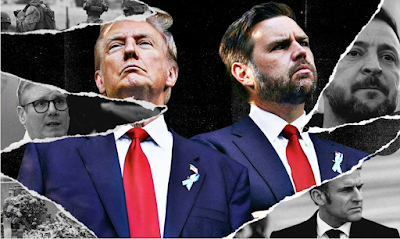 Photo composite: Guardian Design/Getty Images/Rex/Shutterstock/AP/PA
Photo composite: Guardian Design/Getty Images/Rex/Shutterstock/AP/PA
Trump and Vance have done nothing less than expose the naked truth—theking has no clothes, dramatically and pathetically so.
Looking at what’s happening in the world these past monthsand weeks, it’s enough to leave anyone speechless for many reasons. First andforemost, there are the “Trump revolutions” – in both domestic and foreignpolicy – that are radically reshaping scenarios and narratives that once seemedsolid and almost unchangeable.
Another reason for astonishment comes from Europe, meaningthe European Union and the United Kingdom, due to the spectacle of impotenceand indecision they’ve been displaying to the entire world regarding peacebetween Russia and Ukraine. Peace seemed distant and complicated by theintransigence of all parties involved: Putin’s Russia, Zelensky’s Ukraine, JoeBiden’s United States, the European Union, the United Kingdom, and NATO. ThenTrump arrived, and almost miraculously, peace now seems just around the corner,or at the very least, much, much closer than it was just a few weeks ago.
Adding to this is the embarrassing inconsistency –dramatically and relentlessly highlighted by JD Vance in his “historic” speechin Munich – of the European Union in relation to its own founding values ofdemocracy and freedom. It’s practically a dystopian scenario where the will ofthe people is crushed and mocked by an all-powerful bureaucracy completelyaligned with international economic and financial elites.
 Victor Davis HansonThe same scenario, to be sure, that Biden’s America and hispuppet masters have been presenting – an America that has forgotten itshistory, its “exceptionalism,” and the immortal principles on which it wasfounded. In this case as well, Trump’s arrival has shaken things up. Arevolution, or rather, as the ever-sharp Victor Davis Hanson observes,a “Trump restoration” emphasizing it as a counterrevolution against the changesbrought by the Obama and Biden administrations. “ We don’t really appreciatewhat we’ve been through with eight years of the Obama revolution and thefour-year, more radical third term of Obama using or employing the wax effigyof Joe Biden,” says Hanson. It was a revolution that was a cultural, economic,political, social revolution, he continues. It was very similar to the FrenchRevolution under the Robespierre brothers: “You should remember what they triedto do. They changed the days of the week. They renamed things. They tore downstatues. They went after the churches.” Does this sound familiar? It was arevolutionary movement: “Movies were different, sports were different. Take aknee.” Then Donald Trump came in and… “It’s a return to normalcy. It’s a returnto common sense. It only looks revolutionary to revolutionaries. But to therest of the people, it is a counterrevolution to restore normalcy and bring thecountry from the far-left fringes back home again.”
Victor Davis HansonThe same scenario, to be sure, that Biden’s America and hispuppet masters have been presenting – an America that has forgotten itshistory, its “exceptionalism,” and the immortal principles on which it wasfounded. In this case as well, Trump’s arrival has shaken things up. Arevolution, or rather, as the ever-sharp Victor Davis Hanson observes,a “Trump restoration” emphasizing it as a counterrevolution against the changesbrought by the Obama and Biden administrations. “ We don’t really appreciatewhat we’ve been through with eight years of the Obama revolution and thefour-year, more radical third term of Obama using or employing the wax effigyof Joe Biden,” says Hanson. It was a revolution that was a cultural, economic,political, social revolution, he continues. It was very similar to the FrenchRevolution under the Robespierre brothers: “You should remember what they triedto do. They changed the days of the week. They renamed things. They tore downstatues. They went after the churches.” Does this sound familiar? It was arevolutionary movement: “Movies were different, sports were different. Take aknee.” Then Donald Trump came in and… “It’s a return to normalcy. It’s a returnto common sense. It only looks revolutionary to revolutionaries. But to therest of the people, it is a counterrevolution to restore normalcy and bring thecountry from the far-left fringes back home again.”
 Simon Jenkins
Simon Jenkins
In foreign policy, the “restoration” is certainly no lessremarkable. Let’s set aside the polemical tone of Trump’s statements, includingsome of his lexical choices—which could be debated at length. If we focus onsubstance, we can’t help but acknowledge the high level of realism, pragmatism,intellectual honesty, and common sense in what the President and his VicePresident have proposed so far. So much so that even the left-leaning British Guardian,through one of its most prominent columnists—former Timesof London editor Simon Jenkins—has had to recognize it. Read it andsee for yourself:
As for Ukraine, enough is enough.Putin is not going to invade the US, nor has he any intention of invadingwestern Europe. If Europe wants to pretend otherwise, champion Vladimir Putin’sfoes, sanction and enrage him, it can do so alone. […]
What Trump/Vance are now saying towestern Europe is get serious. The cold war is over. Youknow Russia has no desire to occupy western Europe. This proclaimedthreat is a fantasy got up by what a wise president, Dwight Eisenhower, calledthe US’s military-industrial complex, long practised at extracting profit fromfear. If Keir Starmer really wants “to give priority to defence”, he can slashhis own health and welfare budgets to pay for it. But is he really thatthreatened, or does it merely sound good?
Joe Biden was meticulous in thedegree of help he extended to Kyiv. Now is the inevitable moment ofextrication, but it will require a very difficult ceasefire to precede it.Without a substantial guarantee from Washington, it is hard to see anythingother than eventual defeat for Kyiv. Ukraine could yet prove a rerun of the USin South Vietnam.
With a minimum of delicacy,Trump/Vance have decided to expose the mix of platitude, bluff and profiteeringthat underpinned much of the cold war. Nato’s victory in 1989 suggested theneed for a shift to a more nuanced multipolar world, one that was neverproperly defined.
Trump/Vance are right that arealignment is badly needed. They have chosen the worst possible moment and theworst possible way to say it. We can be as rude to them as we like, but theywill have US democracy on their side.
In short, according to one ofBritain’s keener observers, Trump and Vance have done nothing less than exposethe naked truth—the king has no clothes, dramatically and pathetically so. Ofcourse, in other parts of the editorial, the tone is scornful (as expected!).And yet, the message is crystal clear—a lesson not just for “progressive”commentators on both sides of the Atlantic, but also for certain conservativepundits who have greeted the Trump administration’s moves with a degree of condescension,if not outright skepticism. If a President and his Vice manage to restore ameasure of truth and common sense through their actions, sweeping away lies andhypocrisy, shouldn’t we at least acknowledge that we’ve all taken a huge stepforward?

* An Italian version of this article is being published in Atlantico magazine.
COPYRIGHT NOTICE:All original content of this blog [Wind Rose Hotel] is subject to Creative Commons license (by-nc-sa)
February 2, 2025
Trump’s hat tip to citizen journalism
My latest on American Thinker.It’s taken a Republican administration to change the crumbling media status quo in Washington.
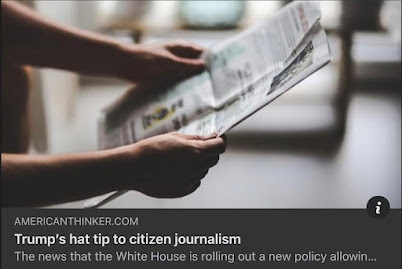
The news that the White House is rolling out a new policy allowing opportunities for so-called “new media” outlets — independent journalists, bloggers, podcasters, content creators, etc. — to ask questions during press briefings marks a significant turning point in the history of journalism. White House press secretary Karoline Leavitt announced the move during her first briefing on Tuesday. “We welcome independent journalists, podcasters, and social media influencers,” she said. “Millions of Americans, particularly young people, have shifted away from traditional television and newspapers to consume news through podcasts, blogs, social media, and other independent platforms. It is crucial for our team to share President Trump’s message widely and adapt the White House to the evolving media landscape of 2025.”
First and foremost, the decision is nothing more than the official recognition of something that had already been in place for some time. It’s called “citizen journalism,” a term that refers to the collection, reporting, and dissemination of news and information by ordinary people rather than professional journalists. It empowers individuals to play an active role in the news-gathering process, often using digital tools and platforms like social media, blogs, and video-sharing websites.
Although “citizen journalism” is a relatively modern term, the concept has existed for centuries. Ordinary people have always shared news through word of mouth, letters, or pamphlets. For example, during the American Revolution, pamphlets like Thomas Paine’s Common Sense were a form of citizen-driven communication. As we all know, especially those who are not so young, the advent of the internet in the 1990s and the proliferation of digital tools in the 2000s revolutionized citizen journalism. Platforms like blogs and forums and social media sites like Twitter, Facebook, Instagram, and YouTube allowed individuals to share news and opinions widely. They become hubs for citizen journalism, especially during crises or protests. In summary, citizen journalism has transformed how news is created and consumed, making it more participatory and decentralized. Although it has its challenges, it has become an essential part of the modern media landscape. [...]
Read more: Trump’s hat tip to citizen journalism

COPYRIGHT NOTICE:All original content of this blog [Wind Rose Hotel] is subject to Creative Commons license (by-nc-sa)
November 5, 2024
O America!
What is at stake on November 5 is the idea of America *
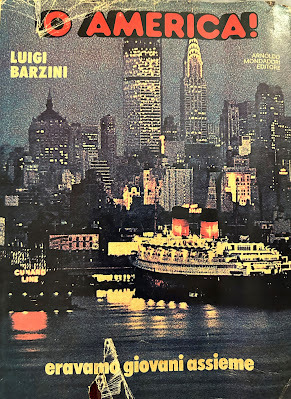 During these pre-election weeks, a two-word phrase keeps coming to my mind. The phrase is the title of a book I read in my20s, O America, by Luigi Barzini.These two words are somehow a concise but accurate summary of what I think andfeel about this election—and what’s at stake in this election. Subtitled WhenYou and I Were Young, thebook is a reflective memoir where the author reminisces about histime in the U.S. from 1925 to 1930. The son of one of the most brilliantjournalists of Italy during the war years, Barzini arrived in the U.S. as ayoung man full of hopes and illusions, and he uses this book to explore hispersonal experiences and impressions of a rapidly modernizing America. Througha poetic and nostalgic lens, he portrays a vibrant and youthful America,detailing the culture, challenges, and unique aspects of American society asseen through the eyes of a young immigrant.
During these pre-election weeks, a two-word phrase keeps coming to my mind. The phrase is the title of a book I read in my20s, O America, by Luigi Barzini.These two words are somehow a concise but accurate summary of what I think andfeel about this election—and what’s at stake in this election. Subtitled WhenYou and I Were Young, thebook is a reflective memoir where the author reminisces about histime in the U.S. from 1925 to 1930. The son of one of the most brilliantjournalists of Italy during the war years, Barzini arrived in the U.S. as ayoung man full of hopes and illusions, and he uses this book to explore hispersonal experiences and impressions of a rapidly modernizing America. Througha poetic and nostalgic lens, he portrays a vibrant and youthful America,detailing the culture, challenges, and unique aspects of American society asseen through the eyes of a young immigrant. My approach to contemporary America, and the tremendouschallenges it faces, foremost among them the upcoming presidential elections,is a bit less poetic and nostalgic and a bit more dramatic. The stakes areincredibly high and the only literary genre allowed is tragic theater. Thenagain, as Victor DavisHanson suggested, Donald J. Trump might embody thecharacteristics of a tragic hero in the ancient Greek sense, and the entirecomplex reality of American history in these years can be seen through the lensof tragedy—and we know, since Nietzsche, that if tragic language is born “fromthe spirit of music,” the tragic scene is born from the vision of the lyricalpoet. Hence, perhaps, in the present days, my inclination towards poeticinvocations, such as Barzini’s “O America,” or Langston Hughes’s poem “LetAmerica Be America Again”:
LetAmerica be America again.
Let it be the dream it used to be.
Let it be the pioneer on the plain
Seeking a home where he himself is free.
…
But really, in just a few words,how could we express what is at stake on November 5, the 60th presidentialelection in United States history? Let’s say that, beyond the many issues onwhich the lives of millions of Americans—and very likely billions of peoplearound the world—depend, what is most at stake is an idea: the idea of America.‘Things change, the world changes, we cannot remain loyal to outdated conceptsand values.’ So say the enemies of that idea (even though, of course, they denybeing so). But the truth is that the idea of America, far from being subject tofads, fancies, and chatter of Hollywood stars and mainstream media gurus, mustbe seen, so to speak, sub specieaeternitatis (in the perspective of eternity).
The American experiment began with a revolutionary idea thata nation could be founded on the principles of democracy, equality, andliberty. The wager was that a coherent, stable culture allowing thegreatest possible freedom of religious and political thought and expressioncould actually be created. The idea of America envisions a society where allpeople can pursue their dreams and live without oppression. When the FoundingFathers wrote about “the pursuit of happiness” in the Declaration of Independence,they referred to an individual’s right to seek a fulfilling and meaningfullife. This phrase implies that people are entitled not only to basic freedomsbut also to the chance to improve their lives, pursue passions, make choices,and seek well-being, however they define it. Happiness, in this sense, is morethan pleasure; it’s about purpose, dignity, and the opportunity for personaland social growth. The government’s role, as envisioned by the Founders, is toprotect these rights so each person can freelypursue their version of happiness without undue restriction.
Unfortunately, in our days, certain societal forces—such asunchecked globalization, identity politics, and the erosion of nationalborders—are diminishing the traditional role of citizenship in the UnitedStates. Yet, a meaningful and unified American identity, based on sharedvalues, is essential for sustaining the nation’s democratic fabric. TheAmerican founding ideals rely on a cohesive sense of citizenship, which fostersindividual liberties and collective responsibility. Without revitalizing thesevalues, America risks losing its unique democratic spirit and the socialcohesion that has historically defined it.
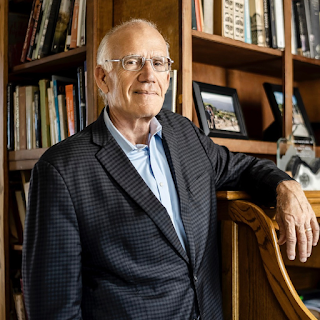 Victor Davis HansonIn his books—such as The Dying Citizen and Mexifornia—articles and lectures, Victor Davis Hanson often points to historical precedents from classical civilizations, comparing modern challenges to those faced by ancient Greece and Rome, where similar internal divisions and weakened citizenship led to political decline. “America,” he writes in The Dying Citizen,” was always about self-governing citizens who took pride in their country, were autonomous and self-sufficient, and who recognized that citizenship implied both rights and responsibilities.” Here he emphasizes that the American ideal is built on the concept of responsible citizenship and individual sovereignty, viewing these core values as essential to preserving freedom and democracy. Real lovers of America must advocate for a return to a robust concept of citizenship that honors American principles of self-governance and national sovereignty, aware that without these ideals American society risks losing the cohesion and vitality that make it unique.
Victor Davis HansonIn his books—such as The Dying Citizen and Mexifornia—articles and lectures, Victor Davis Hanson often points to historical precedents from classical civilizations, comparing modern challenges to those faced by ancient Greece and Rome, where similar internal divisions and weakened citizenship led to political decline. “America,” he writes in The Dying Citizen,” was always about self-governing citizens who took pride in their country, were autonomous and self-sufficient, and who recognized that citizenship implied both rights and responsibilities.” Here he emphasizes that the American ideal is built on the concept of responsible citizenship and individual sovereignty, viewing these core values as essential to preserving freedom and democracy. Real lovers of America must advocate for a return to a robust concept of citizenship that honors American principles of self-governance and national sovereignty, aware that without these ideals American society risks losing the cohesion and vitality that make it unique.That said,we can return to the point where we started and add that there are anincreasing number of people who, thanks to the good ideas and prodigioustenacity of Donald J. Trump, look forward with hope and confidence to theapproaching historic moment. Of course, if “The Chosen One” loses, most likelyeverything—along with the idea of America—is lost. But this is not going to bethe case. O, America, in you we trust. And may God always bless theUnited States of America.
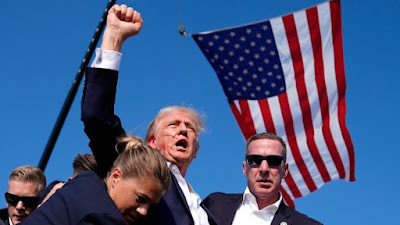

* An Italian version of this article is being published in Atlantico magazine.
COPYRIGHT NOTICE:All original content of this blog [Wind Rose Hotel] is subject to Creative Commons license (by-nc-sa)
July 30, 2024
Luck or God?
My latest on American Thinker.My take on a timeless, but very current, issue. Many top Republican officials have embraced divine intervention -- “the hand of God” -- to help explain how former president Donald J. Trump survived the recent assassination attempt. By crediting “luck or God” for saving him from the assassination attempt, Trump was cautious, but “open”. He showed statesmanlike wisdom. We ordinary citizens and Christians can afford to go a little further. Personally and honestly, I feel like believing that the world witnessed another miracle performed by God on July 13, 2024. I believe that God spared Ronald Reagan and St. John Paul II for a reason. Likewise, God spared Donald Trump for a reason.
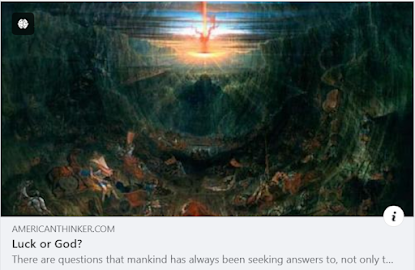
There are questions that mankind has always been seeking answers to, not only through reason and argumentation but through intuition, faith, or direct experience. One of them concerns miracles. Christians believe that the Almighty God communicates with humans in various ways, one of which is through particular events in history or in the present. To be sure, believing that a specific event is actually “a message from Above,” or a miracle, is a personal decision for each individual.
We believers know well that from a Christian perspective the understanding of God’s will can be nuanced and is often viewed as both accessible and mysterious. In other words, you cannot treat what you believe in like something taken from Walmart: chosen, paid for, packaged, and brought home. You cannot take the things we believe in and put them in your pocket: the moment you pronounce their names they escape you because in most cases they belong to the realm of symbols, which by nature allude to something that is hidden, that is elusive. Therefore, for one thing, it is useless to counter our statements from a rationalistic or positivistic standpoint. What purpose do self-referential objections and counter-objections serve? Nobody wants to convince anyone: it would be futile and senseless.
Just recently many top Republican officials were embracing divine intervention -- “the hand of God” -- to help explain how former president Donald J. Trump survived the recent assassination attempt. “The most incredible thing was that I happened to not only turn [my head] but to turn at the exact right time and in just the right amount,” Trump himself said. He also credited “luck or God” for saving him from would-be assassin Thomas Matthew Crooks’s bullet.
Understanding God’s specific will for individual situations can be particularly challenging. There is an acknowledgment that God’s ways and thoughts are higher than human ways and thoughts: [...]
Read more: Luck or God?

COPYRIGHT NOTICE:All original content of this blog [Wind Rose Hotel] is subject to Creative Commons license (by-nc-sa)
June 9, 2024
How the West Was Lost at Oxford University
My latest on American Thinker.The British cultural establishment triumphantly welcomed a new history book according to which Western civilization has always been a bad idea... This unequivocally means that the capitulation of the British cultural establishment to “woke” culture — and other elite obsessions — is complete.
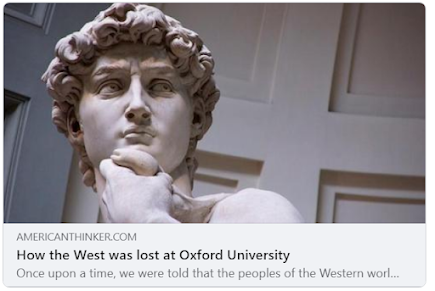
Once upon a time, we were told that the peoples of the Western world — which includes countries like Australia and New Zealand, although located in the Eastern Hemisphere — are heirs and trustees of Western civilization, imbalances and excesses included. Often referred to simply as “the West,” Western civilization is a broad concept used to understand the cultural, social, political, and economic norms, traditions, values, and institutions that originated in or are associated with Europe. It has its roots in Ancient Greece and Rome as well as in Christianity, humanism, the Renaissance, the Enlightenment, and the Industrial Revolution. It values rationalism, democracy, and individual freedoms and rights.
Later on, Marxist and otherwise far-left historians argued that the history of the West is marked by exploitation and conflict among different social classes, from feudal lords and serfs in the Middle Ages to capitalists and workers in the modern era. Marxists, in particular, introduced the concept of cultural hegemony, formulated by Antonio Gramsci to describe ideological domination of the bourgeoisie over the proletariat. In other words, according to this type of approach, the dominant cultural norms and values of Western civilization serve to maintain the power of the ruling class.
As of now, the left-wing narrative is that Western civilization is an illusion. Postmodern and deconstructionist historians have claimed that the West is a late invention of the 18th-century philosopher. Skeptical of the grand narratives that have historically been used to describe Western civilization, such as progress, enlightenment, etc., they argue that these narratives often oversimplify complex histories and marginalize alternative perspectives.
It is in this context that the new book How the World Made the West, written by Josephine Quinn, professor of ancient history at Oxford University, needs to be read. It’s aimed to bring to fulfillment the goal and the dream of legions of leftists the world over and from time immemorial. [...]
Read more: How the West Was Lost at Oxford University

COPYRIGHT NOTICE:All original content of this blog [Wind Rose Hotel] is subject to Creative Commons license (by-nc-sa)
March 19, 2024
Ukraine’s War: Let’s Hope Trump Wins
My latest on American Thinker.In short, the scenario is that of a Western world in the grip of a strange obsession arising from a misunderstanding, whereby we are confronted with the possibility of WW III without there being any good reason for it.

When three weeks ago French President Emmanuel Macron said he refused to rule out sending ground troops to Ukraine, his words stood in stark contrast to both the European and American “red line” when it comes to putting boots on the ground in that country. As a matter of fact, several NATO countries, including the U.S., Germany and the UK, were quick to rule out that hypothesis. The "path to victory" is providing military aid "so Ukrainian troops have the weapons and ammunition they need to defend themselves," a White House statement said. Analogously, German chancellor Olaf Scholz, UK prime minister Rishi Sunak’s spokesman, and the office of Italian prime minister Giorgia Meloni reiterated the agreed commitment to supporting Ukraine without including the presence of troops from European or NATO states on Ukrainian territory.
Since then things haven’t changed that much, except that the awareness that the risk of plunging the world into the Third World War has increased. This is especially thanks to three factors. The first is the so-called Weimar Triangle. “Today we agreed on a number of priorities, including the immediate procurement of even more weapons for Ukraine on the entire world market,” announced Scholz at the end of a summit meeting, held on March 15, with the French president and the Polish prime minister Donald Tusk referring to the launch of “a coalition of Ukraine’s allies for long-range weapons.”
The second factor is the insistence with which Macron reiterates his position. “Maybe at some point -- I don't want it, I won't take the initiative -- we will have to have operations on the ground, whatever they may be, to counter the Russian forces,” the French president told newspaper Le Parisien in an interview on Friday.
The third factor is the myopia with which NATO chief Jens Stoltenberg [...]
Read more: Ukraine’s War: Let’s Hope Trump Wins

COPYRIGHT NOTICE:All original content of this blog [Wind Rose Hotel] is subject to Creative Commons license (by-nc-sa)



